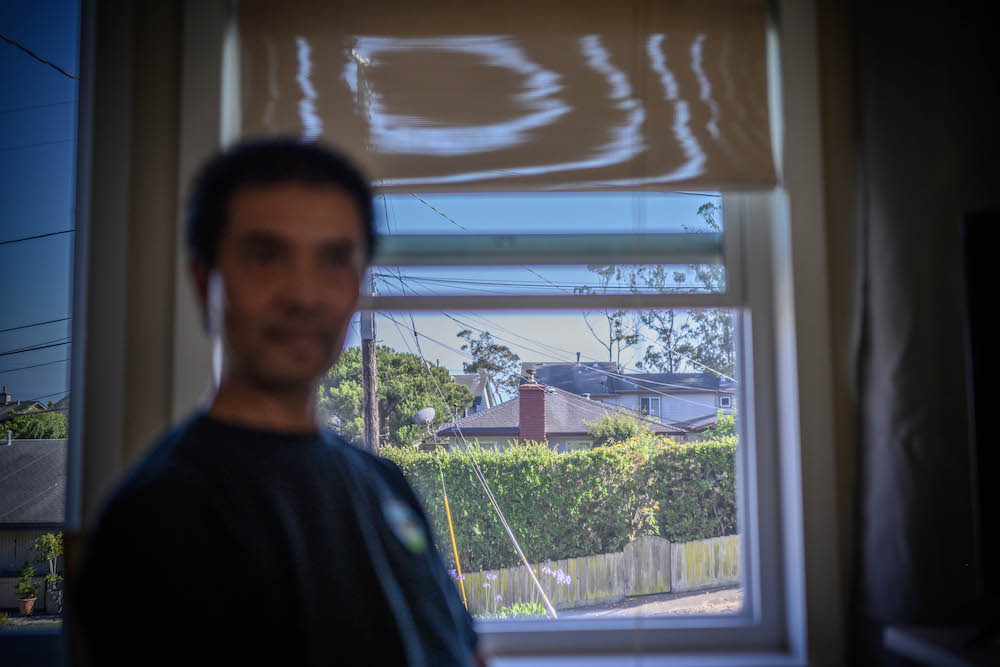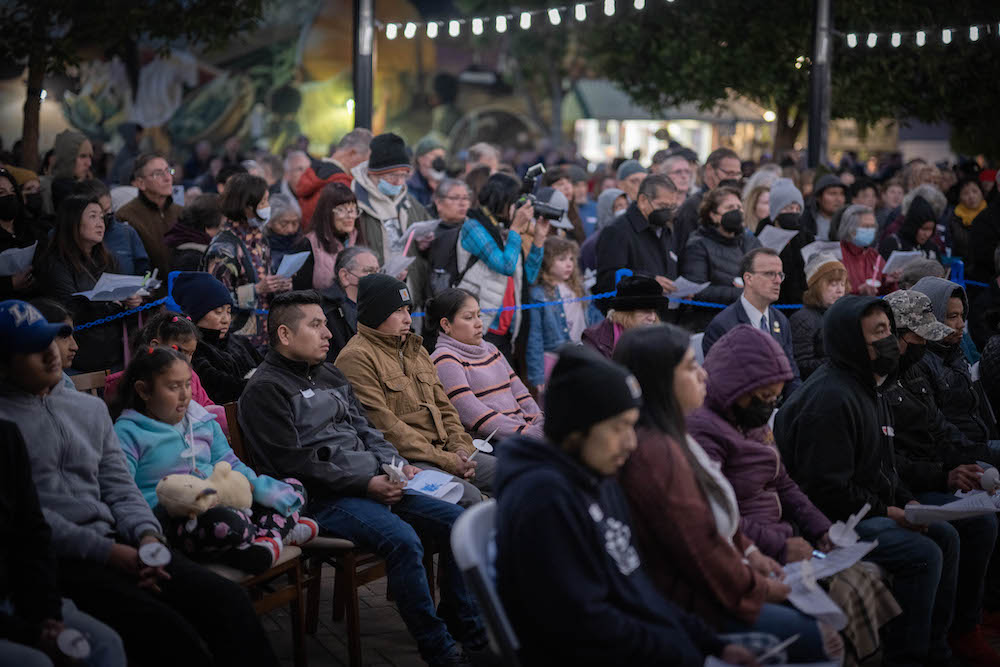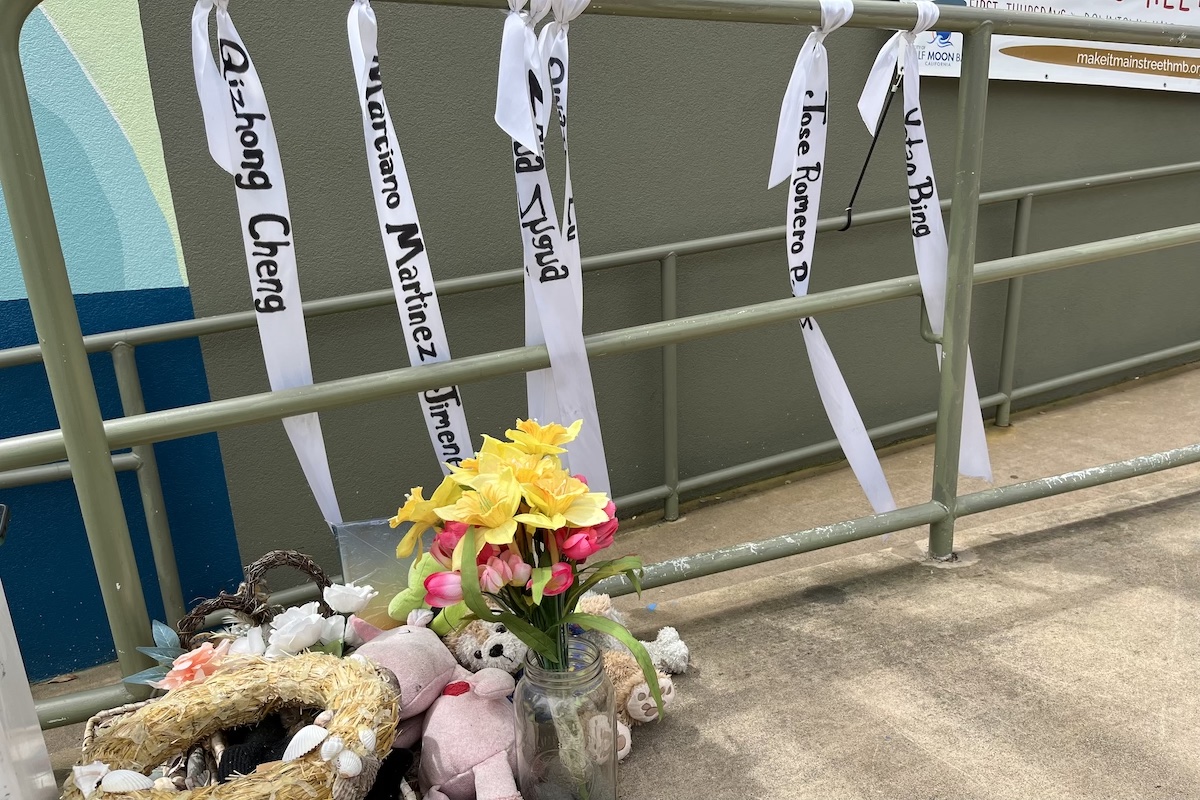HALF MOON BAY, Ca. – Mr. Huang lives in a modest, one-bedroom apartment just off Highway 1 a few miles outside the city of Half Moon Bay. Originally from Hong Kong, he stands at the front door to welcome the coterie of support providers arriving for one of their regular visits.
Before January, Huang and a handful of other Chinese farmworkers here were so invisible that few in this otherwise tight-knit coastal community even knew they existed.
“We’re like goldfish in a bowl,” said Mr. Huang (asking that we only use his last name), speaking in Cantonese through a translator. “We swim around and around, with no connection to the outside.”

That near-total isolation was shattered on Jan. 23, when 66-year-old Chunli Zhao opened fire at the California Terra Garden, where Mr. Huang lived and still works, and one other farm, killing seven. The deaths came within days of another mass shooting in Southern California – the perpetrator in that case also an older Asian man – and on the heels of Lunar New Year, typically a time of celebration and family gatherings.
More than six months out, some half dozen Chinese farm workers impacted by the shooting linger under a cloud of uncertainty over their long-term housing and employment. All say images from that night continue to haunt them.
“I have a lot of nightmares,” says Mr. Liu, 65, sitting next to his wife in a rental townhouse a few short miles outside the city. Both lived and still work at Concord Farms, the second of the two farms impacted that night, and were there the night of the shooting. “I wake up at night and I am very alert.”
The couple, originally from China’s Shaanxi Province, first came to the Half Moon Bay farm in 2006. They learned of the job through an ad in a local Chinese newspaper while staying with a relative. (The owners of both farms involved in the shooting are Chinese American.)
Ms. Liu says when they first got to the farm, she worried about the housing conditions and low pay but adds they were grateful to have employment and a roof. “The place was humid and damp, with mold. I worried about my husband’s health.” But, she adds, “Being here in the U.S. is much better for us. We can make money and support relatives in China.”
‘I still see their faces’
All five of the Chinese farm workers interviewed for this story say they returned to work almost immediately after the shooting, largely out of financial need. But according to Mr. Liu, those hours after work, sitting in his new temporary home with nothing to distract him, are the hardest. “I still see their faces,” he says of those he spent years working alongside.
Five of the seven victims killed that night were Chinese, most of them seniors like the Liu’s. Contact with relatives has been sporadic, with few if any details available on who the victims were, meaning their deaths – much like the lives they led on the farm – remain in obscurity.
One of those killed was Jingzhi Lu, 64. The meals she prepared on the farm offered a nightly point of contact between the mostly Latino farmworkers and the small group of Chinese, according to Enrique Bazan with the non-profit Ayudando Latinos a Sonar (ALAS). “Mama Lu, they called her,” says Bazan, referring to the group of children ranging in ages from 4 to 6 who participate in a weekly group therapy session organized by ALAS. “They still ask about her.”
Karen Decker is Half Moon Bay’s community and economic vitality manager. She says in the days following the shooting, Chinese farmworkers hesitated to reach out or take part in a memorial organized by the city. “They were afraid of a backlash,” she notes, pointing to the ethnicity of the suspect and the ongoing rash of attacks targeting Asian Americans.
Connecting the group to support services also proved daunting in the immediate aftermath, adds Decker, who is bi-racial and is herself a member of the Asian Pacific Islander community. City officials promptly turned to a handful of non-profits in nearby San Francisco, including Chinese for Affirmative Action, Self Help for the Elderly and Chinatown Community Youth Center, whose efforts were key to establishing an open line of communication and trust.
But, says Decker, the shooting’s toll on survivors has deepened with time.
“As the days turn to weeks and months, I see difficulty in some of our survivors in terms of how they can navigate a tragedy like this,” she explains. “Because after the funeral, after the bodies were repatriated to their countries of origin, after the media left, that is when it really starts to set in… There is no going back.”
Fears of housing insecurity
Both farms were fined recently for federal health and safety violations, fueling anxieties among survivors that the farms may close and leave them unemployed and potentially unhoused.
All of those impacted by the shooting – which remains an open investigation – were initially housed in a local hotel, and later placed in individual Airbnb units before being moved to temporary rentals paid for by San Mateo County through early next year.
Plans are in the works to build more permanent housing for older farm workers, though in the Bay Area’s notoriously expensive housing market, getting that done fast and below cost will be difficult.
Gov. Newsom’s office announced in June it would provide $16 million to support homeownership for farmworkers in the state, including $5 million set aside for survivors of the Half Moon Bay shooting. But that remains a drop in the bucket in an area where median home prices approach $2 million.
“We have a housing emergency,” says Half Moon Bay City Manager Matthew Chidester. “There just aren’t places for these folks to live. We’re tapping state money and land… and are trying to do this fast development to build a nice community for them to live in going forward.”

In the meantime, this small group of Chinese farmworkers – including the spouse of the shooter – are left to ponder an uncertain future in this idyllic coastal city they all say they cherish, despite the isolation.
“It’s beautiful,” agrees Mr. Huang, who has worked on the farm here for near two decades.
He then recalls the first time he encountered another Chinese-speaker at a local coffee shop (Mr. Huang is a self-described coffee lover). “I was so happy,” he says, “just to be able to speak with someone.”
This is the first in a series of reports by EMS and Peninsula 360 Press looking at the long-term impacts of the Jan. 23 mass shooting in Half Moon Bay, in partnership with the Vincent Chin Institute.
The Half Moon Bay project is supported in part by funding provided by the State of California, administered by the California State Library in partnership with the California Department of Social Services and the California Commission on Asian and Pacific Islander American Affairs as part of the Stop the Hate program. To report a hate incident or hate crime and get support, go to CA vs Hate.






